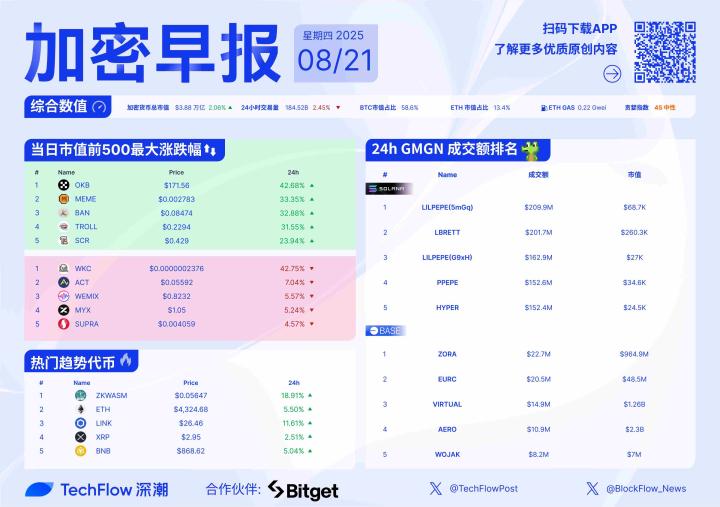As the August breeze sweeps across the magnificent peaks of the Teton Mountains in Wyoming, the global financial world traditionally focuses on one event: the Jackson Hole Central Bank Annual Conference. Here, the Federal Reserve Chairman and central bank governors discuss the future of monetary policy behind closed doors. However, in the summer of 2025, the script of the old order is quietly being rewritten. Three days before the central bankers arrive, another more boisterous and disruptive gathering - the Wyoming Blockchain Symposium - has already "occupied" this small town.
This event, jointly hosted by the crypto exchange Kraken and Anthony Scaramucci's investment platform SALT, is no longer just a niche gathering for crypto enthusiasts. The attendee list itself is a shocking headline: two potential successors to Powell as Federal Reserve governors, the newly appointed SEC Chairman, and Donald Trump's son Eric Trump.
This is more than just a conference; it's more like a carefully orchestrated "coronation". It marks a fundamental transformation of the crypto industry's status in the United States - from a marginal outsider on Wall Street to a core participant closely connected with the Washington power corridors. What this summit reveals is a blueprint of a new American financial order drawn by clear regulations, friendly oversight, and massive capital.
Regulatory "Big Bang": A New Legal Code Tailored for Crypto
For a long time, the US crypto industry has struggled in the fog of regulation, constantly facing the Damocles sword of "regulation by enforcement". The Wyoming summit in 2025, however, is convened under an unprecedented regulatory clear sky. The foundation of all this is a milestone legislation dubbed the "GENIUS Act" by the industry.
This bill, initiated by Republican Senators Cynthia Lummis and Tim Scott and signed into law by President Trump, provides the first comprehensive and clear federal regulatory framework for the US stablecoin market. According to top law firm Latham & Watkins' analysis, the bill's core is that it clearly defines "payment stablecoins", requiring issuers to hold high-quality cash or cash equivalents at a 1:1 ratio, and granting primary regulatory authority to banking regulators, not the SEC. Crucially, it separates these compliant stablecoins from the "securities" category.
"This is a clear runway, not an obstacle course," commented a stablecoin issuer executive in attendance.
If the GENIUS Act solved the identity problem of stablecoins, the newly appointed SEC Chairman Paul Atkins' announced "Project Crypto" brings dawn to the broader token ecosystem. Atkins, viewed as extremely crypto-friendly, completely overturned his predecessor's hardline approach.
"Our goal is to nurture innovation, not strangle it," Atkins clearly stated in his speech. He believes only "very few" tokens should be considered securities and promises to provide "bright-line rules" for the market. A key pillar of his "Project Crypto" is allowing "super-apps" that can trade both security and non-security tokens, thus breaking down existing market structure barriers. This marks the SEC's transformation from "police" to "market builder".
These two policies - a stablecoin legislation and a regulatory philosophy about the token market - together constitute a complete, growth-supporting regulatory framework, paving the way for massive capital inflow into the crypto market this summer.
[The translation continues in the same manner for the rest of the text...]Driven by the "Genius Act," the stablecoin market has expanded at an unprecedented speed. As of July 2025, its total market value has exceeded $250 billion. A Goldman Sachs report predicts that USDC's market value alone is expected to grow by an additional $77 billion before 2027.
Meanwhile, a new corporate strategy is gaining popularity on Nasdaq - "Crypto Treasury Companies". These listed companies raise funds through stock or bond issuance, with the primary purpose of purchasing and long-term holding of crypto assets like Bitcoin as core reserves.
According to statistics, by mid-2025, at least 126 global listed companies collectively held approximately 820,000 Bit on their balance sheets. This year alone, these companies have added over 157,000 Bit, valued at more than $16 billion. Leaders in this trend, such as MicroStrategy and the newcomer American Bitcoin, are proving to Wall Street that Bit can be a superior long-term value storage method compared to cash.
This fervent market sentiment is driving the global crypto market's total value to touch the $4 trillion mark for the first time.
Traditional Finance's Embrace: "The Logic of Blockchain is So Compelling"
In this crypto feast, traditional financial (TradFi) giants are equally indispensable. Franklin Templeton's CEO Jenny Johnson led a discussion about "embracing blockchain," and her perspective represents a fundamental shift in Wall Street's attitude.
"When you see the advantages of this technology, its logic is so compelling," Johnson stated, "This transformation will be very rapid." She emphasized that the real opportunity lies in investing in blockchain infrastructure that builds future financial systems, rather than just trading tokens.
This is in stark contrast to years ago when most traditional financial institutions either scoffed at cryptocurrencies or were only willing to offer proxy products like Bit ETFs. Today, from BlackRock to Fidelity to Franklin Templeton, these giants managing trillions of dollars are integrating digital assets into their core businesses with unprecedented depth and breadth.
Conclusion: The Birth of a New Order and Unresolved Mysteries
The 2025 Wyoming Blockchain Summit will ultimately be recorded as a watershed moment. It is no longer a discussion about whether cryptocurrencies can survive, but a declaration about how to build a new financial world deeply involving them. Here, regulators, politicians, entrepreneurs, and investors reached a rare consensus: crypto innovation is key to maintaining America's global financial leadership.
However, beneath this prosperous landscape, the new order brings new questions. Critics, especially voices in Congress, point out that the "Genius Act" still has weak provisions regarding consumer protection, audit requirements, and preventing large tech companies from monopolizing. They worry that an overly relaxed environment might seed the next financial turmoil and provide new loopholes for illegal financial activities.
As attendees leave the fresh air of Jackson Hole and return to their trading halls and offices, they carry not just meeting minutes, but a powerful certainty. The story of America's crypto industry has turned a new page. The question is no longer "if" but "how" - how this emerging, powerful crypto-political alliance will shape the global financial landscape in the coming decades, and how the world will adapt to this new era driven by code and consensus.








